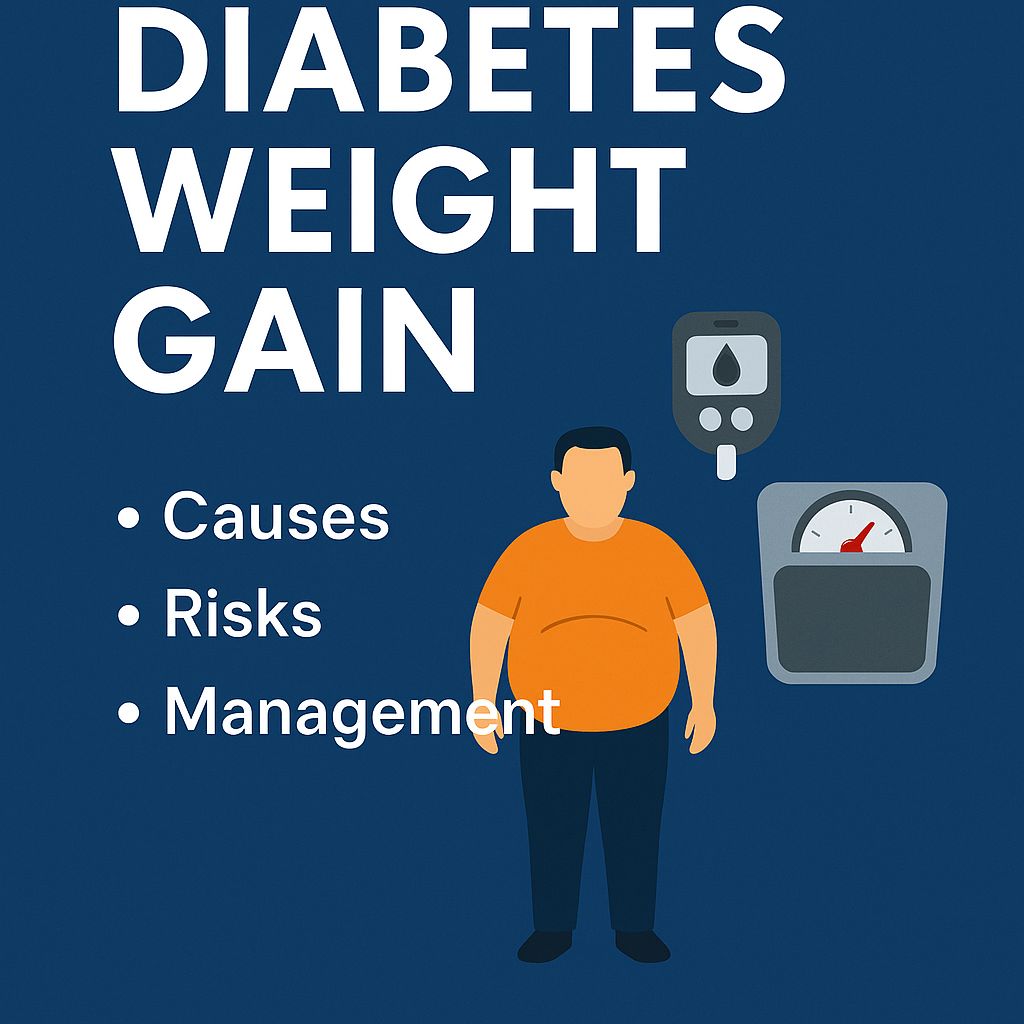The Overlooked Link Between Diabetes and Weight Gain
Living with diabetes is a complex journey, and managing your weight adds another layer of challenge. While most discussions around diabetes focus on blood sugar levels, unintended weight gain—especially in those taking insulin or oral hypoglycemics—is a common and often overlooked issue.
Contrary to the assumption that all individuals with diabetes struggle to maintain weight, many—particularly those with Type 2 diabetes—find themselves gaining extra pounds, which worsens insulin resistance and increases the risk of complications like cardiovascular disease.
In this comprehensive guide, we’ll explore the causes, risks, and sustainable solutions to manage diabetes-related weight gain—so you can take back control of your health.
Section 1: Understanding Why People with Diabetes Gain Weight
1.1 Insulin Therapy and Fat Storage
Insulin is a life-saving hormone, but it also plays a significant role in weight gain, especially in individuals with Type 1 diabetes or those with advanced Type 2 diabetes using insulin.
Why?
Insulin facilitates the transport of glucose into cells—but it also promotes lipogenesis (fat storage). When more insulin is circulating (either due to injection or body resistance), it encourages the storage of excess glucose as fat.
Additionally, patients on insulin therapy may experience hypoglycemia (low blood sugar) episodes, which lead to overeating or frequent snacking, causing further weight gain.
Key Insight: Weight gain is not just a side effect—it’s often a physiological response to insulin excess.
1.2 Insulin Resistance in Type 2 Diabetes
In Type 2 diabetes, the body produces insulin, but the cells don’t respond to it efficiently. This condition, known as insulin resistance, often coexists with abdominal obesity and a slow metabolism.
The pancreas compensates by producing more insulin, which not only elevates blood sugar but also drives fat accumulation—especially around the belly. This sets up a vicious cycle:
More fat → More insulin resistance → Higher insulin → More fat
1.3 Diabetes Medications That Can Lead to Weight Gain
Several commonly used medications for Type 2 diabetes are associated with weight gain:
| Medication Class | Examples | Weight Impact |
| Sulfonylureas | Glipizide, Glyburide | Increase insulin, cause fat gain |
| Thiazolidinediones (TZDs) | Piogliatazone, Rosiglitazone | Fluid retention, fat gain |
| Insulin (all types) | Rapid, Short, Long acting | Encourages fat storage |
Expert Tip: Not all diabetes medications cause weight gain. Some like metformin and GLP-1 receptor agonists (e.g., semaglutide) can promote weight loss.
1.4 Behavioral and Lifestyle Contributors
Weight gain in diabetics is not solely a medical issue—it’s also influenced by lifestyle:
• Frequent low blood sugar → More calorie intake
• Reduced physical activity → Fat accumulation
• Stress and poor sleep → Hormonal imbalances (↑cortisol, ↓leptin)
• Depression or burnout → Overeating or reduced motivation
Section 2: The Dangers of Unmanaged Weight Gain in Diabetics
When weight gain is left unchecked, it worsens diabetic control and increases the risk of:
2.1 Increased Insulin Resistance
The more fat (especially visceral fat) a person carries, the more resistant their cells become to insulin. This leads to:
• Poor glycemic control
• Higher A1c values
• Need for increased medication or insulin
2.2 Cardiovascular Complications
Diabetes and obesity are both independent risk factors for heart disease. Together, they:
• Elevate blood pressure
• Raise LDL cholesterol
• Cause endothelial dysfunction
2.3 Accelerated Diabetic Complications
Excess weight is linked to faster progression of:
• Neuropathy (nerve damage)
• Nephropathy (kidney damage)
• Retinopathy (eye damage)
Section 3: How to Manage and Prevent Weight Gain with Diabetes
Fortunately, weight gain can be controlled—and even reversed—with the right strategy.
3.1 Nutritional Interventions
Eat smarter—not less.
Focus on quality, timing, and balance:
| Strategy | What It Matters |
| Low Glycemic Index(GI) | Slows sugar absorption, stabilizes insulin |
| High fiber intake | Promotes satiety and lowers post meal glucose |
| Portion Control | Prevent overeating without food restriction |
| Regular meal timing | Prevents extreme hunger and hypoglycemia |
| Healthy fats (e.g., avocado) | Improves insulin sensitivity |
Example Foods: Oats, legumes, Greek yogurt, eggs, non-starchy vegetables, almonds, olive oil
Related: Low Glycemic Foods for Diabetics
3.2 Physical Activity
Exercise helps burn calories, build insulin-sensitive muscle, and reduce abdominal fat.
• 150+ minutes/week of aerobic activity (e.g., brisk walking, swimming)
• Resistance training 2–3x/week (e.g., weights, resistance bands)
• NEAT (Non-Exercise Activity Thermogenesis): Simple movements like walking after meals or using stairs can make a big difference
Even a 10-minute walk after meals lowers postprandial glucose spikes significantly!
3.3 Medication Review and Adjustment
Ask your healthcare provider:
• Can I switch to weight-neutral or weight-loss promoting medications?
• Are GLP-1 receptor agonists, SGLT2 inhibitors, or metformin right for me?
• Can insulin doses be adjusted with better lifestyle habits?
3.4 Stress, Sleep, and Hormones
Poor sleep and chronic stress increase cortisol, which promotes fat storage and increases cravings.
• Aim for 7–9 hours of sleep
• Practice mindfulness, yoga, or guided breathing
• Set healthy boundaries to reduce stress overload
Section 4: Sample 1-Day Meal Plan for Weight-Conscious Diabetics
| Meal | Menu |
| Breakfast | Steel cut oats with chia seeds, cinnamon, and boiled egg |
| Snack | Apple slices with peanut or almond butter |
| Lunch | Grilled chicken breast, quinoa, sauteed kale, and cucumber salad |
| Snack | Unsweetened Greek yogurt with walnuts |
| Dinner | Stir fried tofu with broccoli, bell papers and brown rice |
Stay hydrated: Drink 8–10 glasses of water a day
Monitor post-meal glucose to optimize portion sizes
Section 5: When to Seek Professional Help
If you’re gaining weight despite healthy efforts, it may be time to get clinical support.
Consult:
• Endocrinologist for medication evaluation
• Dietitian for personalized meal planning
• Pharmacist for medication-related weight advice
• Behavioral therapist if emotional eating or stress is an issue
Related: How to Manage Diabetes Without Medication
FAQs – Diabetes and Weight Gain
Why do insulin users gain weight?
Insulin promotes fat storage and may lead to hypoglycemia-related overeating.
Is metformin effective for weight loss?
Yes, it’s generally weight-neutral and may help reduce appetite slightly.
Can I lose weight without worsening my blood sugar?
Yes, with gradual changes and proper glucose monitoring, it’s possible to lose weight safely.
Are there diabetes drugs that help with weight loss?
GLP-1 agonists (like Ozempic) and SGLT2 inhibitors (like Jardiance) have shown weight-loss benefits.
Does belly fat worsen diabetes?
Yes, visceral fat around the abdomen increases insulin resistance significantly.
Conclusion: Balance, Not Perfection
Diabetes weight gain is common—but it’s not permanent. With a combination of smart nutrition, consistent movement, medical support, and mental well-being, you can manage your weight and improve your diabetes outcomes.
Progress takes time—but each healthy step matters.
Medical Disclaimer
This article is for educational purposes only and does not replace medical advice. Always consult your healthcare provider before making significant changes to your diet, medication, or exercise routine.



Pingback: Attar Ayurveda Jamun Seed Powder Review: Best Diabetes Aid? - Pharma Heals
Pingback: Control Blood Sugar Levels at Home with Natural Remedies: Complete Guide - Pharma Heals